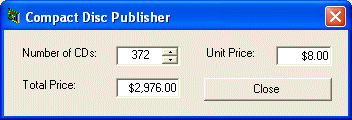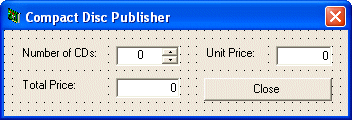
|
In this exercise, we will develop an application for a small CD publishing company. The owner wants the prices to be calculated so a customer would get a discount if he orders more. To attract customers and encourage them to order more, she has decided to fix the prices so that the customer would pay:
- $20/CD if he orders less than 20 units
- $15/CD if he orders less than 50 units
- $12/CD if he orders less than 100 units
- $8/CD if he orders less than 500 units
- $5/CD if he orders more than 500 units
- Start Visual Studio
- Create a new Visual Basic Windows Application and name it CDPublisher
- Design the form as follows:

Control Name Text Other Properties Label Number of CDs: NumericUpDown updQuantity Maximum: 10000
TextAlign: CenterLabel Unit Price: TextBox txtUnitPrice 0 TextAlign: Right Label Total Price: TextBox txtTotalPrice 0 TextAlign: Right Button btnClose Close - Double-click the Close button and implement it as follows:
Private Sub btnClose_Click(ByVal sender As System.Object, ByVal e As System.EventArgs) Handles btnClose.Click Close() End Sub - Double-click the up down button to access its OnChange() event and
implement it as follows:
Private Sub updQuantity_ValueChanged(ByVal sender As System.Object, _ ByVal e As System.EventArgs) Handles updQuantity.ValueChanged Dim Quantity As Integer Dim UnitPrice, TotalPrice As Double Quantity = updQuantity.Value If Quantity < 20 Then UnitPrice = 20 ElseIf Quantity < 50 Then UnitPrice = 15 ElseIf Quantity < 100 Then UnitPrice = 12 ElseIf Quantity < 500 Then UnitPrice = 8 Else UnitPrice = 5 End If TotalPrice = Quantity * UnitPrice txtUnitPrice.Text = UnitPrice.ToString("C") txtTotalPrice.Text = TotalPrice.ToString("C") End Sub - Test the application
- Close it